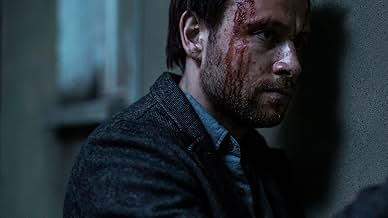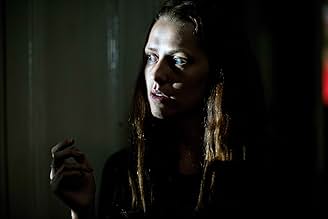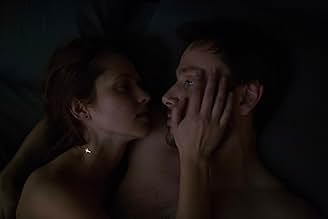VALUTAZIONE IMDb
6,3/10
28.619
LA TUA VALUTAZIONE
Un'appassionata storia d'amore porta a una relazione ossessiva, quando un fotoreporter australiano si sveglia una mattina in un appartamento a Berlino e non può andarsene.Un'appassionata storia d'amore porta a una relazione ossessiva, quando un fotoreporter australiano si sveglia una mattina in un appartamento a Berlino e non può andarsene.Un'appassionata storia d'amore porta a una relazione ossessiva, quando un fotoreporter australiano si sveglia una mattina in un appartamento a Berlino e non può andarsene.
- Regia
- Sceneggiatura
- Star
- Premi
- 1 vittoria e 23 candidature totali
Viktor Bashmakov
- Benni
- (as Viktor Baschmakov)
Recensioni in evidenza
I've never seen Teresa Palmer in a film before, which is especially weird because she's Australian. I'm sorry that I haven't, because she was utterly fantastic in Berlin Syndrome.
The story is fairly simple; an Australian tourist is swept off her feet by a charming local in Berlin, staying with him for a couple of days before realising that she isn't allowed to leave.
Palmer's performance as Clare is so excellent that counterpart Max Riemelt can barely keep up, but keep up he does. His character, Andi, can be dashing, friendly and witty, or he can be sinister, cold and (perhaps most frightening) entirely unreadable. While director Cate Shortland surely deserves an enormous share of the credit, a scene I found simply remarkable is one where Andi suffers a loss and we as an audience are still able to feel sympathy alongside Clare for this monster of a human being.
Presumably borrowing the title from Stockholm Syndrome, the lines in the relationship of Andi and Clare do begin to blur throughout the film. Where Clare feels resigned to her fate, she attempts to make the most of her situation. It's a heartbreaking journey into the human mind and what it will do to survive – or keep from going insane. In certain scenarios it's impossible to tell if Clare is so deluded as to be sincerely happy or not, though these scenarios are of course interspersed with descents back into crippling despair.
What's interesting is that we don't simply follow Clare for the duration of the film, but just as often see how Andi is spending his day. It's an interesting division of screen time that frequently has the audience seeing a scene from Andi's point of view as he arrives home; we wonder along with him what Clare has been up to while he's been gone. It's a strangely fun viewing experience watching him examine the apartment for anything amiss or askew.
The cinematography is great, the score fantastic. One thing I loved about the film was its ability to convey so much wordlessly. The two main characters are regularly away from each other, and these scenes are therefore obviously less reliant on dialogue. Despite this, we are able to see and almost breathe the raw, exposed emotion of the duo.
The flaws in this film lay with a couple of weird editing choices (at some point we seem to be misled as to whether a character is painting their own toenails or someone else is painting the toenails of a cadaver, for some reason, and elsewhere a flight of stairs and multiple apartments could absolutely have been less disorienting). Clare also has access to a kitchen, but never uses a knife in an escape attempt. Because of the exciting moment where she finds a screwdriver in an early scene, one would assume that the kitchen is knifeless but we're never shown an empty drawer or anything to indicate a lack of knives. It just felt a little off.
The ending was disappointing; it manages to be both predictable and nonsensical, which isn't a great combination. I didn't let that ruin the film for me, though; Berlin Syndrome is a wonderful character-study and a psychological tornado of violence and suspense.
Sidenote: Do people in Berlin just hate calling the police, or something?
http://alexfalzon.com/berlin-syndrome/ - for spoilers (and more reviews)
The story is fairly simple; an Australian tourist is swept off her feet by a charming local in Berlin, staying with him for a couple of days before realising that she isn't allowed to leave.
Palmer's performance as Clare is so excellent that counterpart Max Riemelt can barely keep up, but keep up he does. His character, Andi, can be dashing, friendly and witty, or he can be sinister, cold and (perhaps most frightening) entirely unreadable. While director Cate Shortland surely deserves an enormous share of the credit, a scene I found simply remarkable is one where Andi suffers a loss and we as an audience are still able to feel sympathy alongside Clare for this monster of a human being.
Presumably borrowing the title from Stockholm Syndrome, the lines in the relationship of Andi and Clare do begin to blur throughout the film. Where Clare feels resigned to her fate, she attempts to make the most of her situation. It's a heartbreaking journey into the human mind and what it will do to survive – or keep from going insane. In certain scenarios it's impossible to tell if Clare is so deluded as to be sincerely happy or not, though these scenarios are of course interspersed with descents back into crippling despair.
What's interesting is that we don't simply follow Clare for the duration of the film, but just as often see how Andi is spending his day. It's an interesting division of screen time that frequently has the audience seeing a scene from Andi's point of view as he arrives home; we wonder along with him what Clare has been up to while he's been gone. It's a strangely fun viewing experience watching him examine the apartment for anything amiss or askew.
The cinematography is great, the score fantastic. One thing I loved about the film was its ability to convey so much wordlessly. The two main characters are regularly away from each other, and these scenes are therefore obviously less reliant on dialogue. Despite this, we are able to see and almost breathe the raw, exposed emotion of the duo.
The flaws in this film lay with a couple of weird editing choices (at some point we seem to be misled as to whether a character is painting their own toenails or someone else is painting the toenails of a cadaver, for some reason, and elsewhere a flight of stairs and multiple apartments could absolutely have been less disorienting). Clare also has access to a kitchen, but never uses a knife in an escape attempt. Because of the exciting moment where she finds a screwdriver in an early scene, one would assume that the kitchen is knifeless but we're never shown an empty drawer or anything to indicate a lack of knives. It just felt a little off.
The ending was disappointing; it manages to be both predictable and nonsensical, which isn't a great combination. I didn't let that ruin the film for me, though; Berlin Syndrome is a wonderful character-study and a psychological tornado of violence and suspense.
Sidenote: Do people in Berlin just hate calling the police, or something?
http://alexfalzon.com/berlin-syndrome/ - for spoilers (and more reviews)
So what we have here, is Fifty Shades of Stockholm Syndrome (Google it if you're unsure what that is, the film will make more sense knowing the definition).
Right off the top, waaaay too slowly paced. I get it, it needed to be a little slow, but not 2 hours (that felt like 3) of slow. Had I watched this film at least 1.25x faster speed, and edited properly, it would have been more enjoyable, and shorter.
The directing was OK, the writing needed tweaking (e.g. the ending was too stale for all that tension that was built up) but the cinematography was on point.
The best part of this film was Teresa Palmer in her role... she aced it. Very convincing and played her emotional roller-coaster well. Max Riemelt was stale and I felt his role should have been cast better or he shouldn't have been as 'flat' as he was. The director needed to direct his role better as he was unconvincing.
The screenplay (combined in part with the score) was the only other positive attribute of this film. The tension was constant, and just when you relaxed, it got built up again.
There were however many plot holes - specifically the amount of defensive weapons available for escaping, such as the heavy pots on the stove, glass from any of the two broken windows that she could have hid pieces and slit his throat while he was sleeping etc... and unnecessary sub-plots (e.g. his dad, the parts when other women touched him and he portrayed a germaphobe).
A few ill-informed reviewers stated it was an independent film, of which it was not. Having production companies left right and center backing it such as: Aquarius Films, DDP Studios, Entertainment One, Film Victoria, Fulcrum Media Finance, Memento Films International, Photoplay Film, Screen Australia, and distributed by Entertainment One, Curzon Artificial Eye, Vertical Entertainment and Netflix... it's clearly not an independent film. For a B-type film with that type of backing, it needed to be much better in my opinion.
So rating it as a B-type film, it's a generous 6/10 from me.
Right off the top, waaaay too slowly paced. I get it, it needed to be a little slow, but not 2 hours (that felt like 3) of slow. Had I watched this film at least 1.25x faster speed, and edited properly, it would have been more enjoyable, and shorter.
The directing was OK, the writing needed tweaking (e.g. the ending was too stale for all that tension that was built up) but the cinematography was on point.
The best part of this film was Teresa Palmer in her role... she aced it. Very convincing and played her emotional roller-coaster well. Max Riemelt was stale and I felt his role should have been cast better or he shouldn't have been as 'flat' as he was. The director needed to direct his role better as he was unconvincing.
The screenplay (combined in part with the score) was the only other positive attribute of this film. The tension was constant, and just when you relaxed, it got built up again.
There were however many plot holes - specifically the amount of defensive weapons available for escaping, such as the heavy pots on the stove, glass from any of the two broken windows that she could have hid pieces and slit his throat while he was sleeping etc... and unnecessary sub-plots (e.g. his dad, the parts when other women touched him and he portrayed a germaphobe).
A few ill-informed reviewers stated it was an independent film, of which it was not. Having production companies left right and center backing it such as: Aquarius Films, DDP Studios, Entertainment One, Film Victoria, Fulcrum Media Finance, Memento Films International, Photoplay Film, Screen Australia, and distributed by Entertainment One, Curzon Artificial Eye, Vertical Entertainment and Netflix... it's clearly not an independent film. For a B-type film with that type of backing, it needed to be much better in my opinion.
So rating it as a B-type film, it's a generous 6/10 from me.
Wow! This film really builds up the tension. I don't want to say much about the third act, except that I think it was good. I particularly enjoyed the sound design in this film, and how it added so much to the suspense and mystery. I wasn't immediately sold on the actors, but they sort of grew on me. They certainly played their roles well, I just felt like maybe they were lacking a bit of emotional range or chemistry with each other. It didn't detract from what is a truly excellent horror film of its genre. It is brutal, genuinely scary, haunting. You truly feel the hopelessness and anguish of the female character. The sheer dread of her situation. You wonder how you would behave if you found yourself in that same scenario. That's what good horror is all about.
"Berlin Syndrome" (Australia 2017) One of the newly available releases on Netflix from my Max Riemelt. A good (but not great) psychological thriller set in Berlin.
Clare (played by "Point Break's Teresa Palmer) is a young Australian woman on vacation in Berlin. Andi (Riemelt) is a local high school teacher who she meets on the street/in a bookstore. What was intended to be a one night stand turns very wrong when she awakens the next morning to find herself locked inside Andi's isolated and (soon to be revealed) well-fortified apartment.
The remainder of the film, which I would estimate spans a period of 6-9 months, is focused on Clare adapting and attempting to survive her captivity. There are clues that her predesessor didn't fare so well!
Both leads did a decent job portraying their respective characters and the cinematography and sound editing were eerie and added to the film's overall feeling of tension.
Critiques: the ending was pretty stale given all of the build-up and there was really no explanation of Andi's psychosis and behavioral anomalies (some hints perhaps but nothing at all concrete). Worth a look....just don't set your expectations too high. [3/5]
Australian Clare Havel (Teresa Palmer) is backpacking in Berlin. She meets a local named Andi and goes home with him. Next morning, she tries to leave after he left for work but finds that she's locked in.
A normal beautiful-woman-getting-kidnapped movie usually involves a violent shove into a murder van. The interesting change in this movie is that Clare willingly walks into her cage. It's a Venus flytrap. The moment of realization is great. I love the camera pushing in on the locked door. I would delay smashing the window. On the negative side, I don't think I care about the guy and his life. He's not original enough. This is a slow creepy movie.
A normal beautiful-woman-getting-kidnapped movie usually involves a violent shove into a murder van. The interesting change in this movie is that Clare willingly walks into her cage. It's a Venus flytrap. The moment of realization is great. I love the camera pushing in on the locked door. I would delay smashing the window. On the negative side, I don't think I care about the guy and his life. He's not original enough. This is a slow creepy movie.
Lo sapevi?
- QuizFilming began in Berlin, Germany, and eventually moved to Melbourne, Australia, where Teresa Palmer finished her scenes. Immediately after, she began filming on La battaglia di Hacksaw Ridge (2016) in Sydney, Australia.
- BlooperClare actually does have access to her mobile phone after Andi removes her SIM card because it is possible to make an emergency call without one.
- ConnessioniFeatured in Half in the Bag: Black Widow (2021)
- Colonne sonoreKottbusser Banger
Written by Oliver Van der Lugt
Performed by Polymath
I più visti
Accedi per valutare e creare un elenco di titoli salvati per ottenere consigli personalizzati
- How long is Berlin Syndrome?Powered by Alexa
Dettagli
- Data di uscita
- Paesi di origine
- Siti ufficiali
- Lingue
- Celebre anche come
- Berlin Syndrome
- Luoghi delle riprese
- Aziende produttrici
- Vedi altri crediti dell’azienda su IMDbPro
Botteghino
- Lordo Stati Uniti e Canada
- 28.660 USD
- Fine settimana di apertura Stati Uniti e Canada
- 22.916 USD
- 28 mag 2017
- Lordo in tutto il mondo
- 397.783 USD
- Tempo di esecuzione1 ora 56 minuti
- Colore
- Proporzioni
- 2.39 : 1
Contribuisci a questa pagina
Suggerisci una modifica o aggiungi i contenuti mancanti

Divario superiore
What is the streaming release date of Berlin Syndrome - In ostaggio (2017) in Brazil?
Rispondi





























